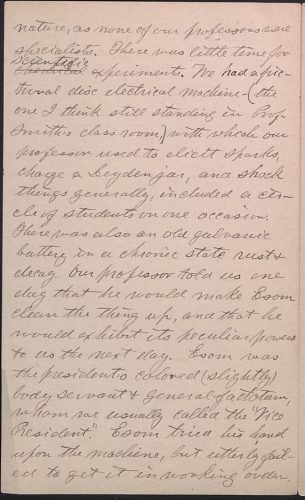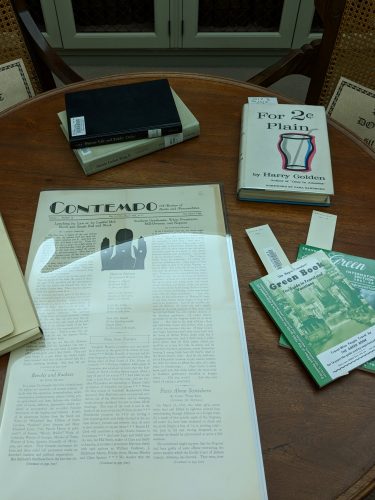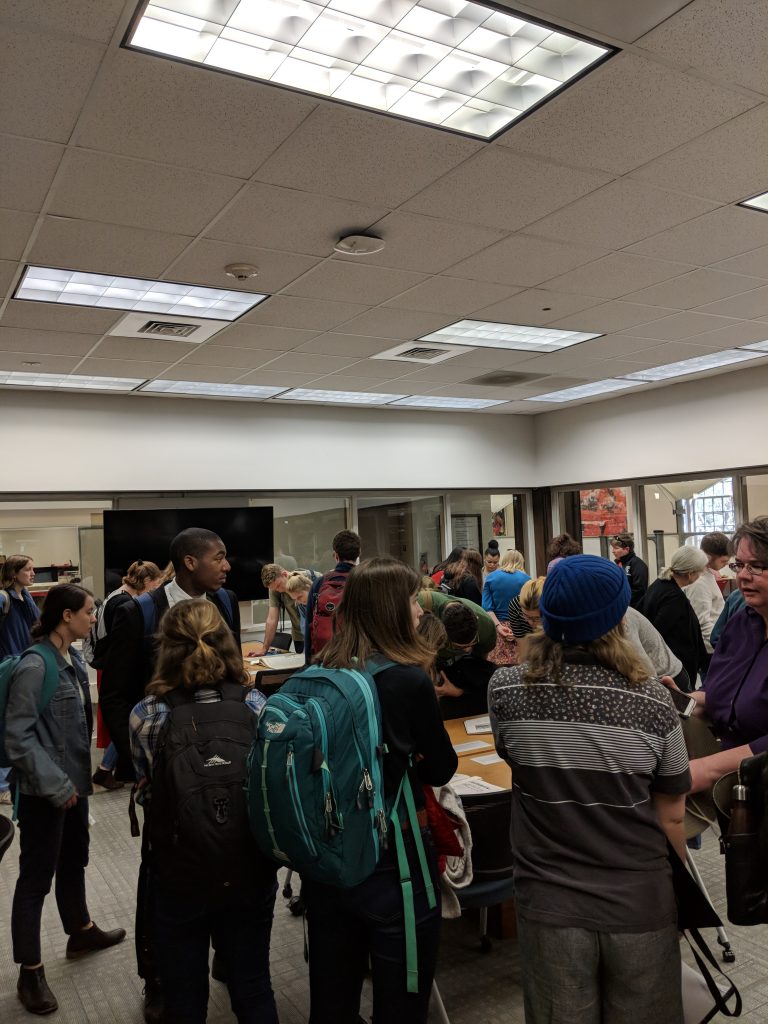The Justice, Equality, Community (JEC) grant is a three year, campus-wide initiative to support increased interdisciplinary engagement with issues of race, gender, religion, and social justice within the humanities at Davidson College.
The grant documents state: “A more publicly available and promoted archives will inspire transdisciplinary coursework in the humanities through the use of archival materials, promote avenues for increased original student research in the humanities, and enable Davidson to develop reciprocal relationships with community partners—all in support of increased dialogue around issues of justice, equality, and community in the curriculum and in the community.”
To accomplish these goals, the archival component of this initiative has four main tasks:
· Identify and digitize JEC collections.
· Integrate JEC materials into at least 5 new courses.
· Expand archival collections related to JEC, particularly the oral history collections.
· Lead public programming about JEC materials, both on campus and in the larger community.

This handwritten reminiscence of life at Davidson College was written in the 1840s by an alumnus, Reverend Jethro Rumple. The document contains a description of the College President’s “body servant,” Esom. This item was digitized with JEC grant funds and can be found on DigitalNC.org.
In order to more effectively engage our audiences and build a stronger collection, we selected a thematic focus for each year. For the academic year 2017 – 2018, we focused on 19th century Davidson. Working with partners like DigitalNC and H.F. Group, we identified and digitized thousands of items related to this theme. These materials are available through Davidson College’s research guides – a centralized platform familiar to our students and faculty, while also being accessible to the general public.
We have built on these efforts throughout the 2018 – 2019 academic year by highlighting and expanding our records related to alumni and student activism through support for course-based oral history projects, the on-going digitization of our existing oral history collections, and more targeted student outreach.
Some of these materials have already been incorporated into a variety of classes, including Introduction to Africana Studies (AFR 101), Environmental History (ENV 256), Slavery and Africa (HIS 366), Native Women (HIS 243), WRI 101, the Humanities Program (HUM 103, 104), US Latinx History (HIS 259), Women and Slavery in the Black Atlantic (AFR 329), and Origins of the American South (HIS 242).

Special collections material pulled for the Fall 2018 Humanities course.
In many of these classes, as well as others, students often express concern that “Davidson is always talking about where we’re going, but rarely talks about where we’ve been.” Students wonder about how their legacy will be represented—and if it will be represented.
Understanding we were uniquely positioned to address this concern, we formed the JEC Student and Alumni Advisory Council—if we were targeting students, we wanted to empower students as full archival partners to recognize their labor for us, as well as in the community.
The JEC Advisory Council, composed of Davidson College students and recent alumni and led by the JEC Project Archivist, was established in the Fall 2018 semester to document and publicize the ways in which students have engaged with and responded to historical and contemporary manifestations of injustice and inequality in Davidson and the surrounding area.

STATEMENT OF PURPOSE
Supported by the archival portion of the JEC Andrew W. Mellon Foundation grant, we are working to synthesize information from academic, administrative, and social spheres for a better understanding of campus culture and greater acknowledgment of student work. The ultimate goal of this project is to address gaps between student needs and institutional responses, empower students to better leverage archival resources, and to promote dialogue around increased accountability for supporting student-led projects.
To accomplish this, we will identify, collect, and digitize the data, records, and oral histories of student organizations and their community partners, both through the acquisition of existing documentation and the recording of information that does not exist in a formal or textual source; following this, we will organize programming according to our findings in order to facilitate meaningful conversations and tangible impacts.
We are confident that, in addition to meeting our primary goals, this project will also promote a better understanding of the archives as a resource and increase transparency around the processes and accessibility of college documentation, thus creating a foundation for future projects and coalitions.
MEMBERSHIP (2018 – 2019)
Kaitlin Barkley, ’21
Yashita Kandhari, ’20
H.D. Mellin, ’20
Carlos Miranda Pereya, ’18
Arianna Montero-Colbert, ’19
Jonathan Shepard-Smith, ’18
MEMBERSHIP (2019 – 2020)
Jonathan Shepard-Smith, ’18
Marlene Arellano, ’17
Yashita Kandhari, ’22
H.D. Mellin, ’20
Maurice Norman, ’20
Sanzari Aranyak, ’22
The statement of purpose was written and approved by the inaugural members of the JEC Student and Alumni Advisory Council in March 2019. The group has met on a monthly basis since January 2019. If you have any questions or would like more information, please contact Jessica Cottle at jecottle@davidson.edu.

Speak Your Mind